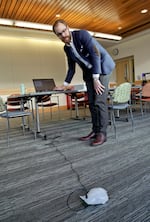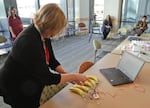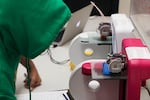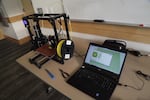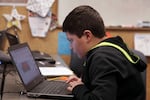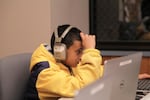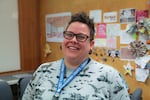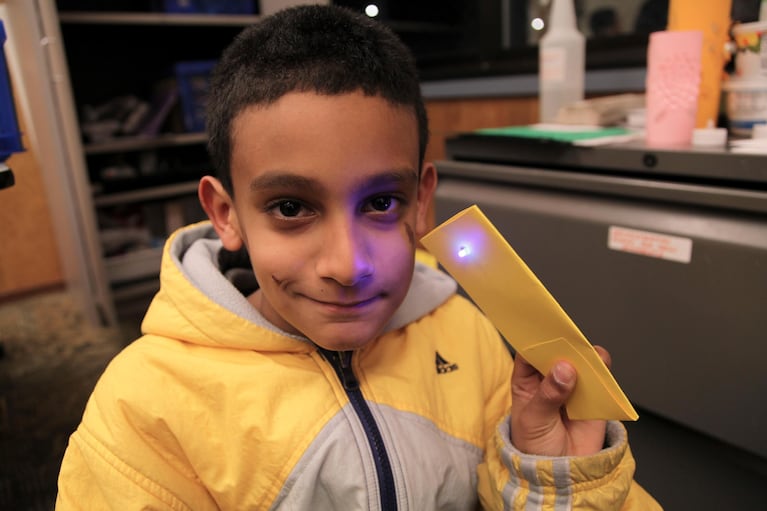
Samuel Figueroa, 10, shows off an LED light he wired at the Multnomah County Library's Rockwood branch.
John Strieder / OPB
On a January night in a back room at the Rockwood branch library in Gresham, Lyndsey Runyan and a full house of kids clustered around the 3-D printers.
"What are you going to do with it when you take it out of here?" Runyan asked Ethan Turpin as he watched a printer form a tiny box out of a stream of gummy syrup.
"I might display it in my room," he said.
“Like a trophy?” Runyan asked. "Your first 3-D print?"
"Yeah. This is probably the coolest thing I've ever built."
As Multnomah County Library's first creative learning spaces coordinator, Runyan is overseeing the creation of the library's first "maker space." The 1,000-square-foot expansion at the Rockwood branch will be geared towards youth with an opening date set as April 2.
“We see kids playing on the computers playing games all the time,” she said, “and I think that we want to engage them more actively with our services. So that means pulling them into these rooms and saying, ‘You love to play video games, now you can create one.’”
There’s been a growing trend in libraries for several years to create maker spaces — places where cutting-edge creative activities such as computer-aided design, robotics, programming, circuitry and audio-visual editing take their place alongside low-tech crafts like sewing and jewelry-making.
"Certainly it focuses on technology, which is new,” said Multnomah County Library director Vailey Oehlke, who is also the president of the National Public Library Association. “But I'd also suggest that libraries have a long history of responding to the ways in which community and the world around us is changing. There’s a need in our community for people to understand these new skills.”
Banana Pianos At The Eugene Library
Just down Interstate 5, a second library is also opening a dedicated maker space. The Eugene Public Library is spending $200,000 to remodel two rooms for a maker hub and digital media lab that will offer its first Open Labs beginning March 20.
Yes, they have a 3-D printer too. Librarian Matt Neer showed it off, along with some of the other equipment the library is stockpiling, such as a Finch robot. “It’s a pretty affordable robot for kids to learn robotics and programming,” he said.
And staff have connected a Makey Makey circuit board to a laptop to make a banana piano. “You can make your own video game using Scratch [programming language] and then play it with bananas or potatoes,” Neer said.
The mix of equipment in Eugene will include everything from embroidery machines to green screens, along with expensive software that people might not have access to, like Pro Tools and the Adobe Creative Cloud.
Eugene library director Connie Bennett says public libraries are considering the emerging needs of their communities.
“Places in Chicago, New York and Denver have found that by offering space with equipment that provides training for job placement, it offers the ability to learn new skills,” she said.
Building these dedicated maker spaces is the next step towards meeting these needs. In the past, libraries were where anybody could go to check out a compact disc or use a computer they otherwise couldn’t afford. Now, there are more options.
“There are maker spaces in Eugene that require membership fees,” said Bennett. “There is equipment like this at the University of Oregon, in the school system, but you have to be enrolled and taking a class, so it's not entry-level access for an entire community."
Whereas, she said, the equipment at the Eugene maker space will be accessible to anyone with a library card.
“The library is not just for the affluent and privileged, it's really for everyone,” she said.
